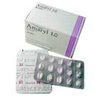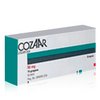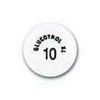 | Forxiga Active Ingredient: Dapagliflozin Forxiga is a tablet medication which helps to reduce blood glucose levels by helping the kidneys to remove glucose from the blood and excrete it within urine. |
INDICATIONS
Forxiga is used to treat adults with type-2 diabetes.
Forxiga can be used on its own in patients whose blood glucose (sugar) levels are not satisfactorily controlled on diet and exercise alone and who cannot tolerate metformin (another antidiabetes medicine).
Forxiga can also be used as an ‘add-on’ to other antidiabetes medicines, including insulin, when these medicines together with exercise and diet are not providing adequate control of the diabetes.INSTRUCTIONS
The recommended dose of Forxiga is 10 mg once a day. If Forxiga is used in combination with insulin or medicines that make the body produce insulin, their doses may need to be reduced to decrease the risk of hypoglycaemia (low blood sugar levels). As the effects of Forxiga are dependent on kidney function, the effectiveness of the medicine is reduced in patients with reduced kidney function.
Therefore, the use of Forxiga is not recommended in patients with moderately or severely reduced kidney function. For patients with severely reduced liver function a starting dose of 5 mg is recommended.DOSAGE
Please consult a doctor regarding the required dosage. The recommended dose of Forxiga is 10 mg once a day.
STORAGE
Dapagliflozin tablets should always be kept in the original container and stored at room temperature. You must also make sure the medicine is kept out of the sight and reach of children.
Forxiga must not be used in people who are hypersensitive (allergic) to dapagliflozin or any of the other ingredients.
Do not take this medication if:
you have moderate-to-severe reduced kidney function or end stage kidney disease;
you have Type I diabetes.The most common side effect with Forxiga (seen in more than 1 patient in 10) is hypoglycaemia when used with a sulphonylurea or insulin. For the full list of side effects reported with Forxiga, see the package leaflet.
Contact your doctor if you experience these side effects and they are severe or bothersome. Your pharmacist may be able to advise you on managing side effects.
back pain
constipation
diarrhea
flu-like illness
headache
nausea
pain in the arms, legs, hands, or feet
sore throatCheck with your doctor as soon as possible if any of the following side effects occur:
redness or rash of the penis or foreskin (yeast infection)
signs of dehydration (e.g., decreased urine, dry skin, dry and sticky mouth, sleepiness, dizziness, headache, thirst, confusion)
signs of vaginal yeast infection (e.g., vaginal odour, curd-like discharge, itching)
symptoms of low blood sugar (e.g., cold sweat, cool pale skin, headache, fast heartbeat, weakness, blurred vision)
symptoms of a urinary tract infection (e.g. pain when urinating, urinating more often than usual, low back or flank pain, strong odour)
 AmarylAmaryl is used for treating type 2 diabetes in patients who cannot control blood sugar levels by diet and exercise alone.as low as $0.54
AmarylAmaryl is used for treating type 2 diabetes in patients who cannot control blood sugar levels by diet and exercise alone.as low as $0.54 AvaproAvapro is used for treating high blood pressure alone or with other medicines.as low as $0.78
AvaproAvapro is used for treating high blood pressure alone or with other medicines.as low as $0.78 ActosActos is used for treating type 2 diabetes in certain patients.as low as $0.43
ActosActos is used for treating type 2 diabetes in certain patients.as low as $0.43 Actoplus MetActoplus Met is used for treating type 2 diabetes.as low as $1.06
Actoplus MetActoplus Met is used for treating type 2 diabetes.as low as $1.06 CozaarCozaar is used for treating high blood pressure alone or with other medicines.as low as $0.88
CozaarCozaar is used for treating high blood pressure alone or with other medicines.as low as $0.88 Glucotrol XLGlucotrol XL is used for treating type 2 diabetes in patients who cannot control blood sugar levels by diet and exercise alone.as low as $0.38
Glucotrol XLGlucotrol XL is used for treating type 2 diabetes in patients who cannot control blood sugar levels by diet and exercise alone.as low as $0.38